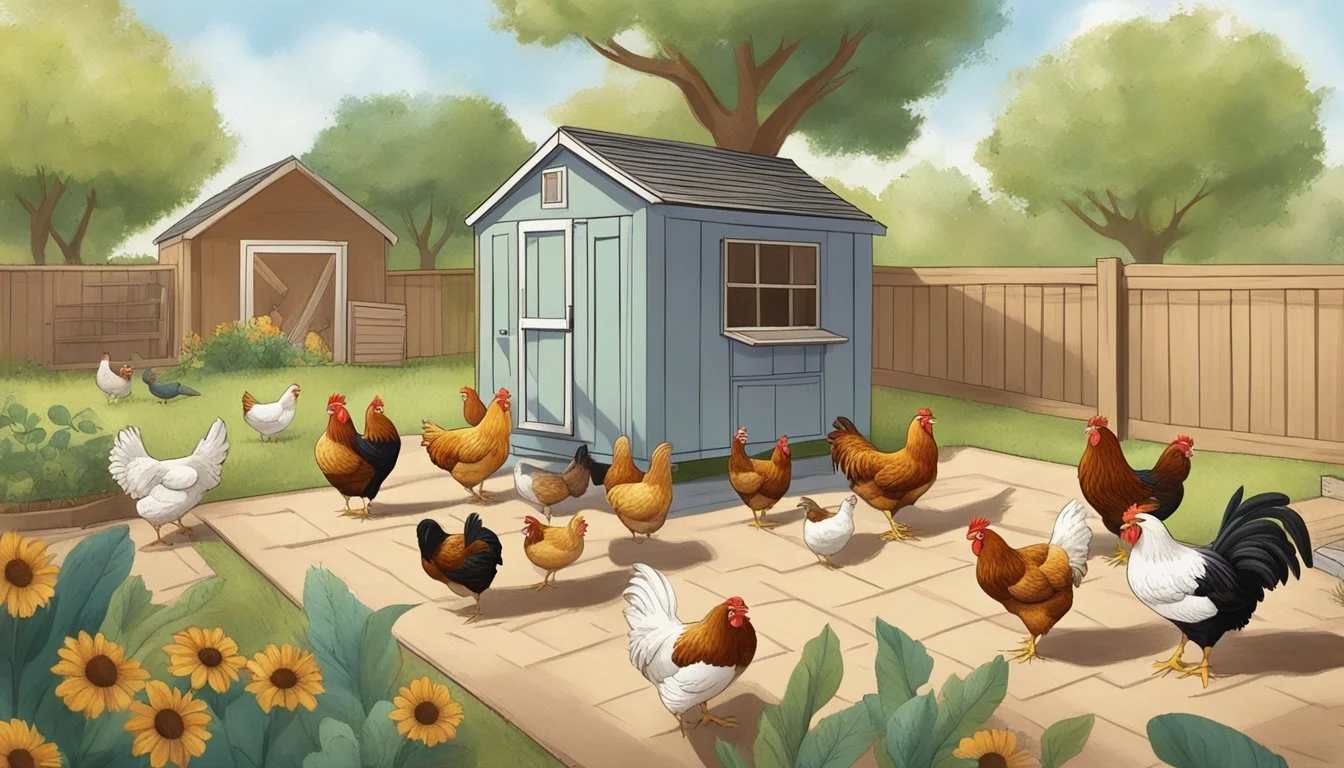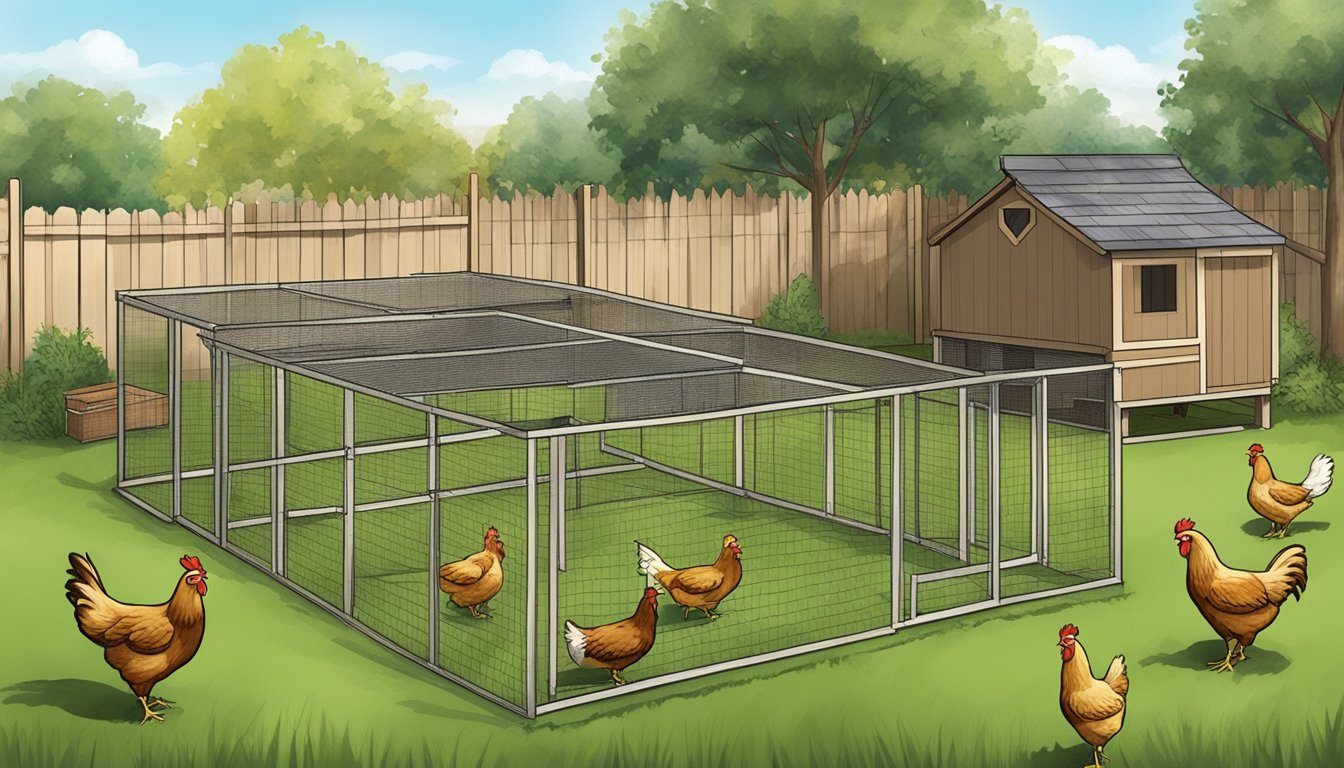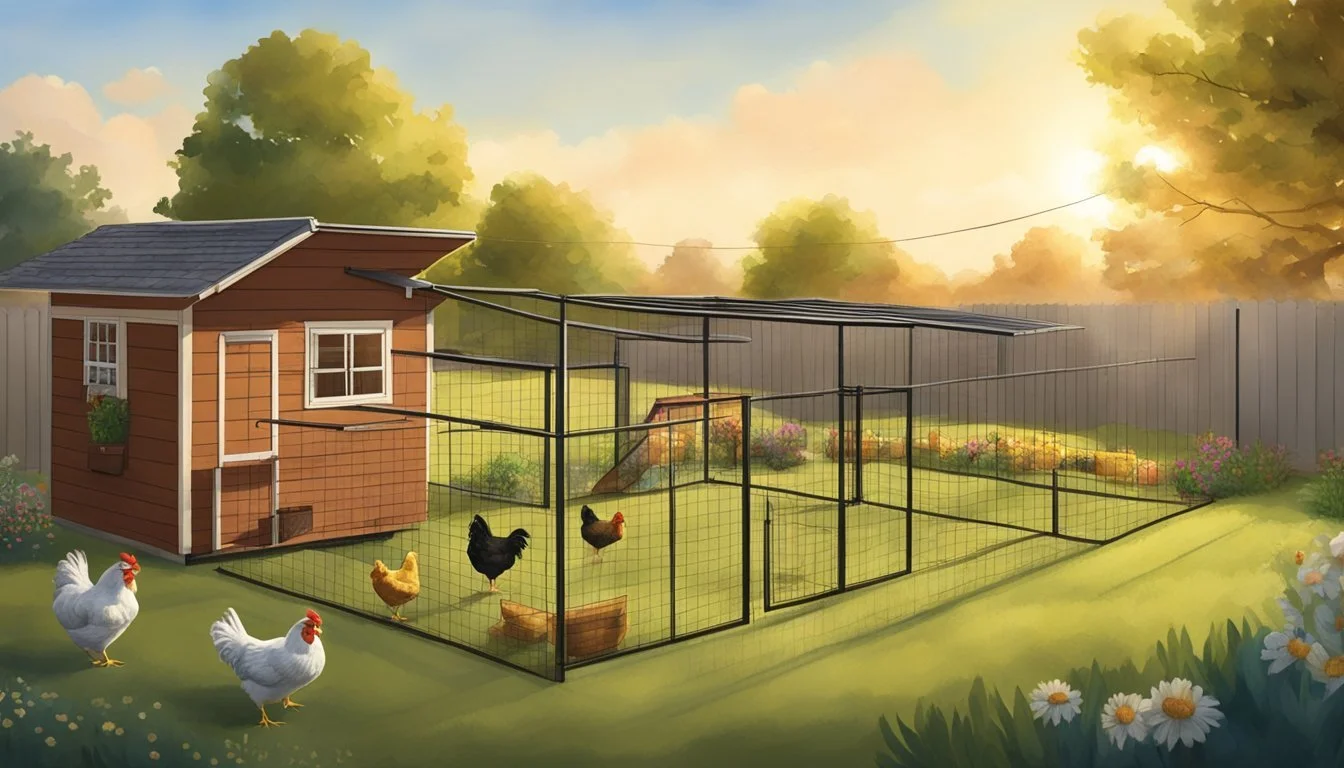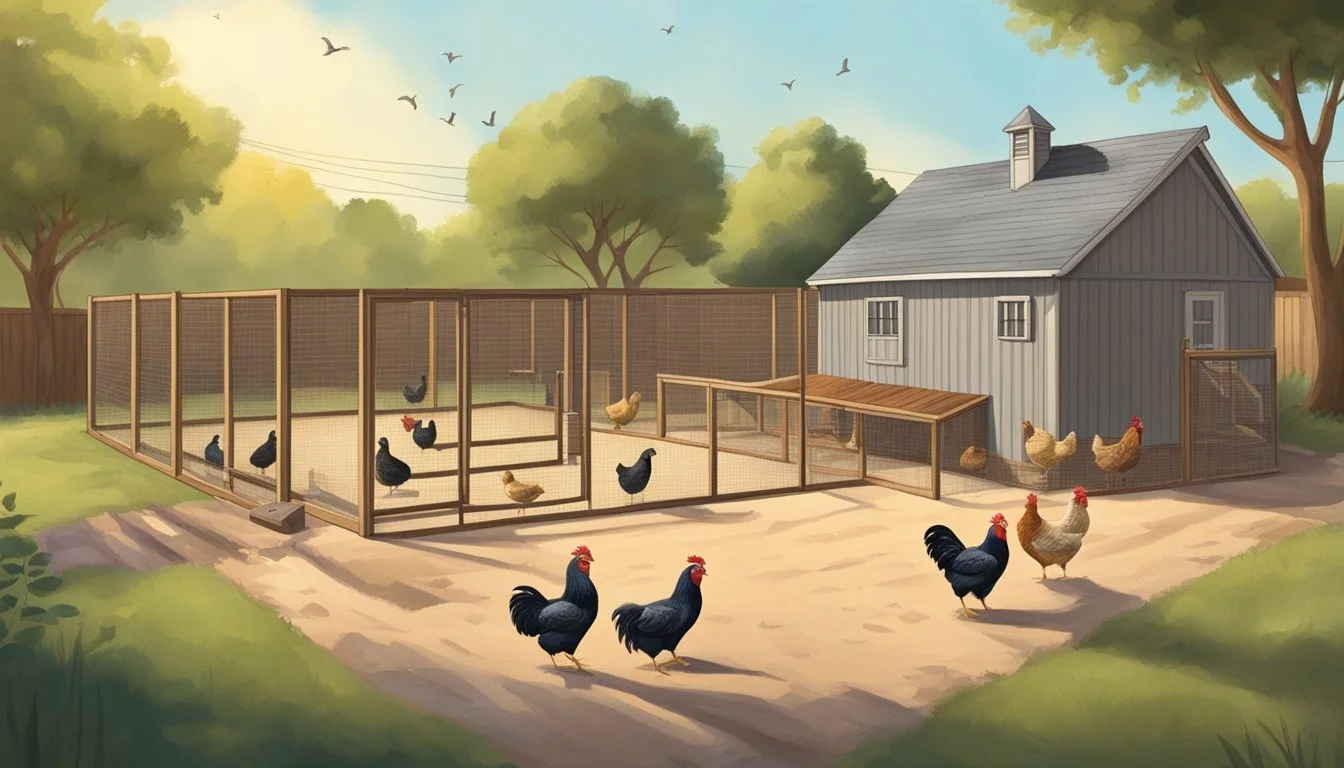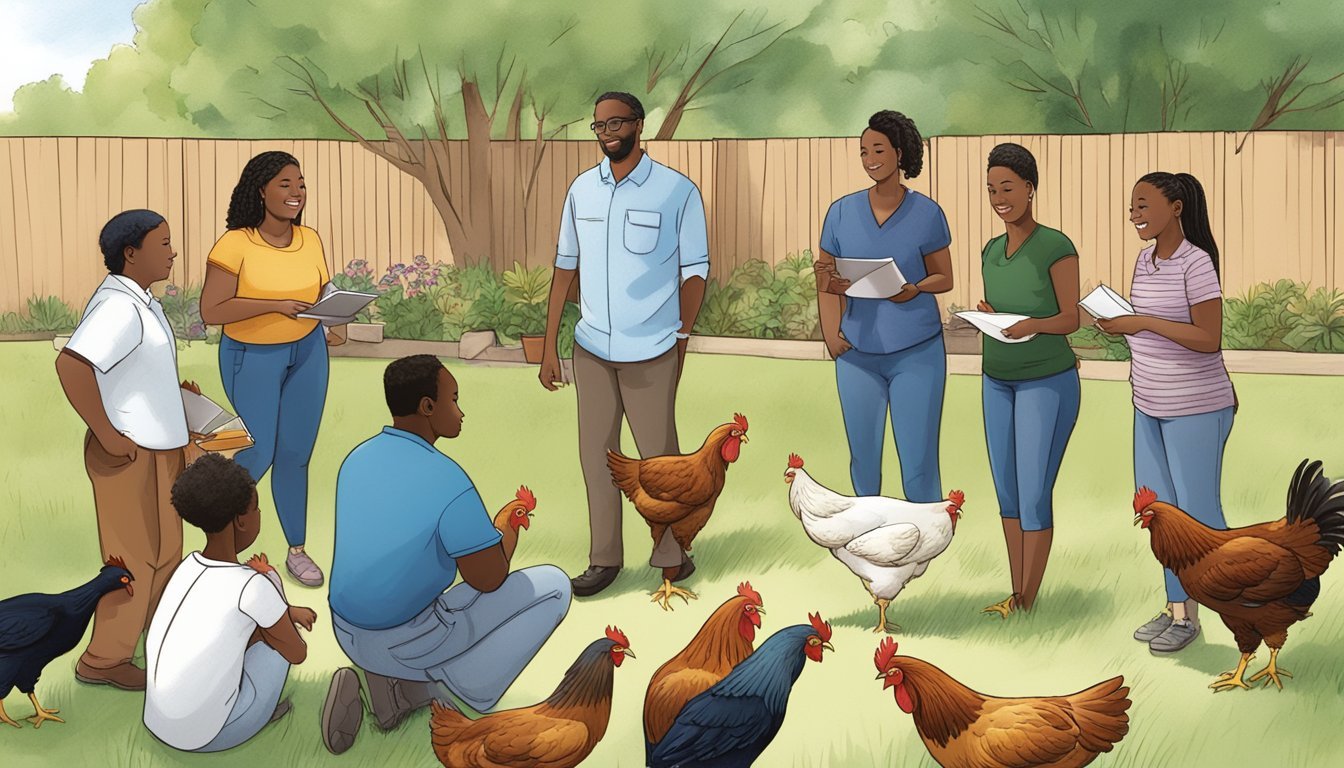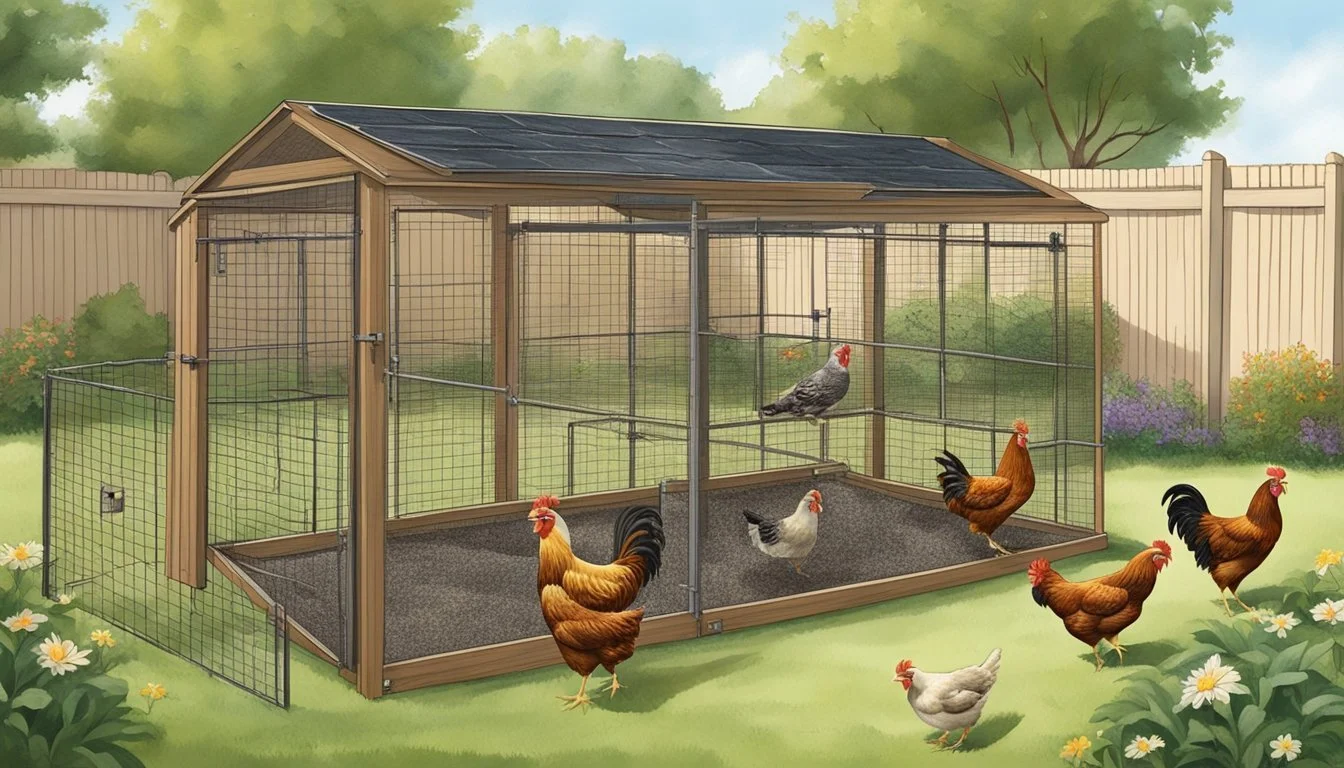Keeping Backyard Chickens in Mesquite, TX
Essential Tips for Success
Raising backyard chickens has become an increasingly popular hobby in Mesquite, Texas, mirroring a broader trend across the state. Homeowners in Mesquite choose to keep chickens for various reasons, including the desire for fresh eggs, natural pest control, and as a means of fostering self-sufficiency. Whether driven by the lessons of recent global events or a simple wish to connect with a more sustainable lifestyle, the community has shown growing interest in this age-old practice.
Mesquite has recognized this interest and has enacted specific ordinances to ensure that the keeping of backyard chickens aligns with the welfare of the community and the birds themselves. For instance, any dog or cat in the city must be vaccinated for rabies by the age of four months, indicating a responsible approach to animal husbandry inclusive of domestic fowl. While maintaining a balance between urban living and backyard farming, these regulations are crucial for the harmony between residents and their feathered friends.
Before embarking on chicken raising in Mesquite, prospective poultry enthusiasts are advised to familiarize themselves with the relevant city ordinances. Such rules help provide a framework for the number of allowed animals, vaccination requirements, and additional care principles. By adhering to these guidelines, individuals in Mesquite can enjoy the pleasures and benefits of raising backyard chickens while contributing positively to the community's well-being.
Understanding Local Legal Framework
When considering the undertaking of keeping backyard chickens in Mesquite, Texas, residents must navigate a variety of legal stipulations that encompass local city ordinances and potential penalties for non-compliance, as well as understand how Mesquite's regulations compare to those of other Texas cities.
City Ordinances and Regulations
Mesquite's legal framework stipulates that it is unlawful to keep animals in a manner that causes nuisance through noise, odors, or disease. Residents are required to adhere strictly to these city regulations.
Specific Restrictions in Mesquite
Specifically, in Mesquite, the ownership of exotic, wild, or dangerous animals is prohibited. This highlights the city's commitment to safety and public health, and while chickens are not classified under this category, their upkeep must still be in compliance with local nuisance laws.
Comparing Mesquite to Other Texas Cities
Compared to cities like Austin, Dallas, Houston, and San Antonio, Mesquite's ordinances on keeping backyard chickens reflect a similar concern for community welfare and public health. However, nuances exist in the specific details of each city's code, which underscores the importance of residents familiarizing themselves with Mesquite's distinctive legal requirements.
Navigating Permit and Legal Requirements
To legally raise chickens in Mesquite, one may need to obtain a chicken permit or comply with city code stipulations. It is crucial for residents to verify whether such permits are required and to understand the process of acquiring them if needed.
Understanding Penalties for Non-Compliance
Non-compliance with city ordinances can result in fines and other penalties. It is imperative for chicken owners in Mesquite to be aware of the consequences of violating local laws, including but not limited to fines for noise ordinance breaches due to excessive chicken noise.
Local Support and Resources
Mesquite residents can seek assistance from local entities about responsible chicken ownership. City council meetings, local community groups, or city-sponsored resources can provide additional guidance.
Neighbor Relations and Community Engagement
Good neighbor relations are important when raising chickens. Residents must consider neighbors' preferences and work collaboratively to ensure that their chicken-raising activities do not infringe upon others' rights to a peaceful and clean environment. Engaging in community dialogue can foster positive relationships and community support.
Setting Up Your Backyard for Chickens
When raising backyard chickens in Mesquite, TX, it is essential to establish a well-suited environment. This includes selecting an optimal location, constructing a secure and comfortable coop, and implementing strategies for hygiene and predator deterrence.
Choosing the Right Location
The ideal location for a chicken coop in Mesquite should offer sufficient space for the birds to roam and exercise. The coop must be positioned at least 50 feet away from neighboring residences to comply with local regulations. Open areas that receive a mix of sun and shade throughout the day are preferable.
Designing and Building a Chicken Coop
A durable chicken coop must provide protection and comfort for the livestock. The coop should be of adequate size — Mesquite's ordinances might specify minimum space requirements. Bedding materials such as straw or wood shavings should be used for insulation and absorption of waste.
Guidelines for Shelter and Protection
Shelter and enclosing fencing are imperative in Mesquite to shield chickens from extreme weather and potential predators. A robust fence should surround the coop to prevent any escapes and entry from predators. The coop itself should offer refuge from the sun and inclement weather, with water and shelter available at all times.
Maintaining Sanitation and Managing Waste
Sanitation is crucial to prevent odors and control the population of flies. Regular cleaning of the coop along with proper waste management, like composting or safe disposal, maintains a healthy environment. Keeping the coop dry will inhibit the breeding of fly larvae and promote overall cleanliness.
Programs for Protection Against Predators
To protect backyard chickens from predators such as foxes and stray dogs, Mesquite residents should incorporate defensive measures like reinforced fencing and secure coop latches. Vigilance and possibly adopting guardian animals could offer additional layers of security.
Considerations for Weather and Climate
In Texas, weather can be unpredictable; it's important to shield chickens from extreme temperatures. The coop should be insulated for both hot and cold weather, ensuring constant access to water during heat and a shielded area to retain warmth during cold spells.
Daily Chicken Care Essentials
In Mesquite, TX, the key to maintaining a healthy backyard chicken flock revolves around consistent and attentive daily care. This section details the foundational aspects of daily chicken care, ensuring that your flock thrives in the local climate and conditions.
Feeding and Nutrition
Proper feeding ensures the chickens receive the necessary nutrients to stay healthy and productive. In Mesquite, TX, a typical adult chicken diet should consist of:
Layer Pellets: Rich in protein and calcium, supporting egg production.
Grit: Helps in digestion, as chickens do not have teeth.
Scratch Grains: A treat that should be given sparingly to avoid obesity.
A regimented feeding schedule helps maintain a routine and prevent overfeeding.
Clean Water Supply and Management
Chickens require constant access to clean water, especially in the Mesquite, TX heat, where dehydration is a risk.
Waterers: Should be cleaned and refilled daily to prevent the spread of disease.
Placement: Keep waterers in the shade to maintain coolness and discourage algae growth.
Monitor water levels frequently due to rapid depletion in higher temperatures.
Routine Health Checks and Disease Prevention
Regular health checks are critical for early detection of potential issues. Each chicken should be inspected for:
Parasites: Check for lice and mites that can cause distress and illness.
Abnormal Behaviors: Such as lethargy or lack of appetite, which could indicate disease.
Vaccinations and proper coop management can reduce the risk of diseases spreading.
Egg Collection and Handling
Eggs should be collected regularly to ensure freshness and prevent breakage:
Frequency: Collect eggs at least twice a day to minimize exposure to bacteria.
Storage: Store in a cool, dry place before washing to remove natural protective coatings.
Each egg should be inspected for cracks or abnormalities before use or sale.
Ethical and Sustainable Raising Practices
Raising backyard chickens in Mesquite, TX, can thrive on ethical and sustainable practices. By emphasizing welfare, reducing neighborhood impact, and promoting autonomy in food production, these practices contribute to a more responsible and beneficial community environment.
Implementing Free-Range Principles
In Mesquite, providing chickens with a free-range environment is crucial. This means allowing ample space for the chickens to roam, forage, and exercise, which is essential for their well-being. Backyard coops should offer at least 10 square feet of outdoor space per chicken, ensuring they can exhibit natural behaviors and maintain physical health. Encouraging outdoor exercise reduces the risk of obesity and increases the overall health of the flock.
Reducing Impact on Neighbors
To maintain harmonious relations, it’s important to manage potential nuisances such as excessive noise or odors. Coop design and positioning can mitigate these issues:
Noise Reduction: Positioning coops away from shared property lines and utilizing sound-absorbing materials can lessen noise carrying over to neighbors.
Odor Control: Frequent cleaning and proper waste management, like composting chicken manure, minimize smells and keep the coop hygienic.
Promoting Self-Sufficiency Through Poultry
Backyard chickens in Mesquite can contribute to household self-sufficiency. These birds can provide a regular supply of fresh eggs, reducing the reliance on store-bought varieties. Additionally, chickens can process kitchen scraps into valuable compost, turning waste into a resource and further enhancing the cycle of self-reliance.
Educating About Humane Treatment
Education on humane treatment is key. Backyard chicken raisers should be well-informed on practices that promote the health and comfort of their flock:
Preventing overcrowding
Providing adequate shelter from extreme weather
Regular health check-ups
Educational resources from local farming groups or extension offices can assist new chicken owners in aligning with ethical and sustainable standards.
Expanding Your Flock
When expanding a backyard flock in Mesquite, TX, owners should focus on breeding strategies, integration of diverse poultry, and adherence to local ordinances to ensure a smooth increase in flock size.
Breeding Chickens and Raising Chicks
Identifying hen breeds prone to broodiness, such as Silkies and Buff Orpingtons, is crucial for natural chick incubation. They can offer reliable hatching services for the new generation of chicks. Owners can alternatively use incubators for controlled breeding. Key factors in successful breeding include maintaining a clean environment, providing adequate nutrition, and monitoring for signs of diseases commonly affecting chicks and chickens.
Integrating Additional Poultry Types
While expanding your flock to include different types of fowl—such as turkeys, geese, or ducks—consider each species' space and dietary requirements. It is imperative to gradually introduce new members to the existing flock to minimize stress and potential aggression. Quarantine new birds for at least 30 days before integration to prevent disease spread.
Staying Informed on Flock Enlargement Regulations
Mesquite's city ordinances must guide any expansion efforts, as they prohibit keeping animals that create a nuisance through noise, odor, or disease. To stay compliant, consult the official City of Mesquite website for the latest updates on regulations related to exotic and wild animals, noise control, and property conditions. Regularly checking with the relevant authorities can prevent legal issues and ensure the wellbeing of the flock.
Community and Educational Opportunities
Mesquite offers a variety of resources for those interested in backyard chicken keeping, from local educational events to online community engagement.
Local Workshops and Courses
The city of Mesquite and local farming co-ops occasionally organize workshops aimed at educating residents about the basics of backyard chicken care. These courses cover essential topics such as coop construction, proper feeding, and general poultry health practices. Interested residents can check for event postings at community centers or agricultural supply stores.
Online Forums and Social Networks
Online platforms provide a wealth of information where Mesquite citizens can discuss and share tips on raising backyard chickens. The most active discussions take place on social media groups and dedicated forums for Texan poultry enthusiasts. Here, newcomers and seasoned chicken keepers alike can connect, ask questions, and exchange advice.
Family Activities and Schools Involvement
Backyard chickens offer excellent learning opportunities for children. Families in Mesquite can integrate chicken care into homeschooling curriculums or science projects. Local schools may also run programs about sustainable living that incorporate lessons on backyard poultry, fostering community involvement and practical learning experiences.
City-Affiliated Events and Programs
The city may feature events like agricultural fairs or farm-to-table events that include educational booths on backyard chickens. These programs and events allow residents to learn more about local ordinances, best practices, and the benefits of raising chickens in an urban setting. Checking the City of Mesquite's official website can provide information on upcoming city-affiliated events.
Troubleshooting Common Backyard Chicken Challenges
As a backyard chicken keeper in Mesquite, TX, it is essential to proactively address issues such as noise, odors, disease, pests, escapes, and legal disputes to ensure the well-being of your chickens and maintain good relations with neighbors.
Handling Noise and Odor Complaints
Backyard chickens can create excessive noise and odors that may lead to complaints. To manage noise, ensure chickens have a consistent feeding schedule and are well-entertained with space to roam. Odor control requires regular cleaning of the coop, proper disposal of waste, and keeping the coop dry to prevent the buildup of ammonia.
Noise Management
Set feeding times
Provide space and activities
Odor Control
Clean the coop frequently
Dispose of waste properly
Maintain dry bedding
Mitigating Risk of Disease and Parasites
Prevent the spread of disease and parasites by implementing strict biosecurity measures. Regularly clean and disinfect the coop and equipment, and enforce a policy of washing hands before and after handling chickens. Keep an eye out for flies, as they can spread disease; managing waste effectively combats fly larvae.
Biosecurity Measures
Cleanliness: Disinfect coop regularly
Hygiene: Wash hands thoroughly
Flies and Parasite Control
Manage waste to prevent flies
Use appropriate parasite treatments
Dealing with Escaped Chickens
An escaped chicken can be a nuisance and risk to safety. Maintain and inspect your fence regularly to prevent escapes. They should have no gaps and be high enough to deter flying over. In case of an escape, gentle herding back to safety is preferable.
Fence Maintenance
Inspect and repair regularly
Ensure adequate height and no gaps
Preventing and Controlling Pests
Pests such as rodents are attracted to chicken feed and waste. Secure the coop against entry and store feed in rodent-proof containers. Regular cleaning reduces the attraction for pests and timely removal of waste minimizes the presence of flies and fly larvae.
Pest Prevention
Secure coop against rodents
Use rodent-proof feed storage
Resolving Legal and Neighbor Disputes
Familiarize yourself with city ordinances and regulations regarding backyard chickens to avoid fines or penalties. Be proactive in communicating with your neighbors to resolve disputes amicably. Should concerns arise, addressing them promptly and courteously often prevents escalation.
Legal Compliance
Understand and comply with ordinances
Maintain record of compliance
Neighbor Relations
Open, proactive communication
Address concerns promptly


